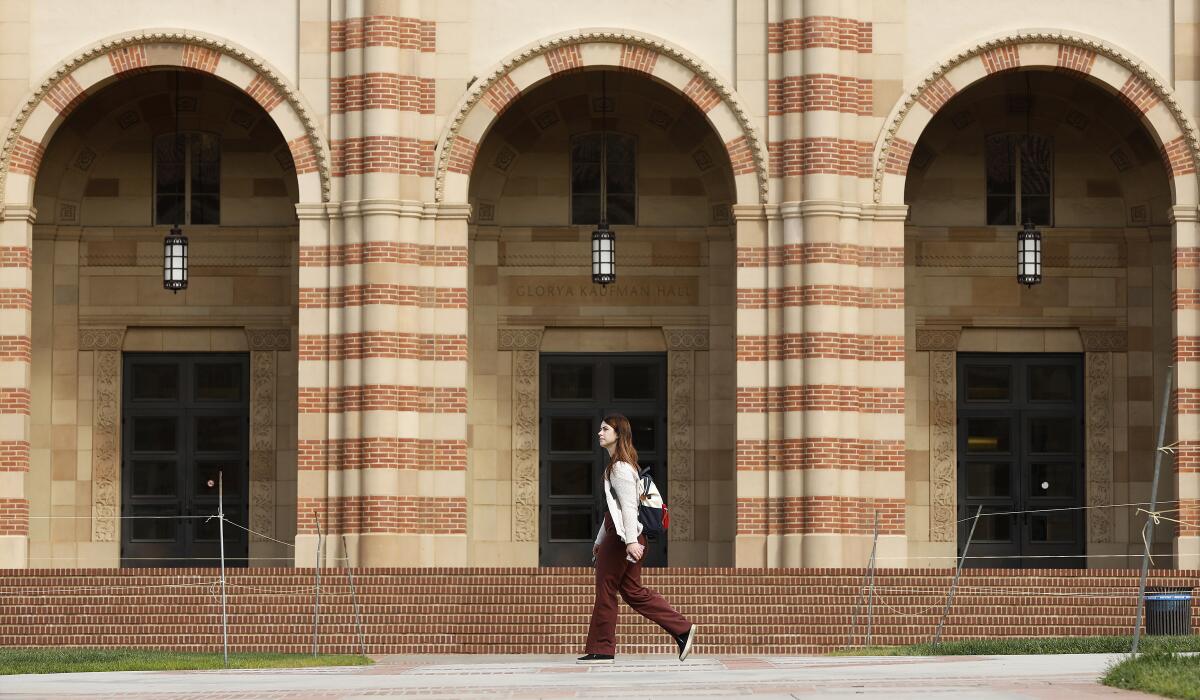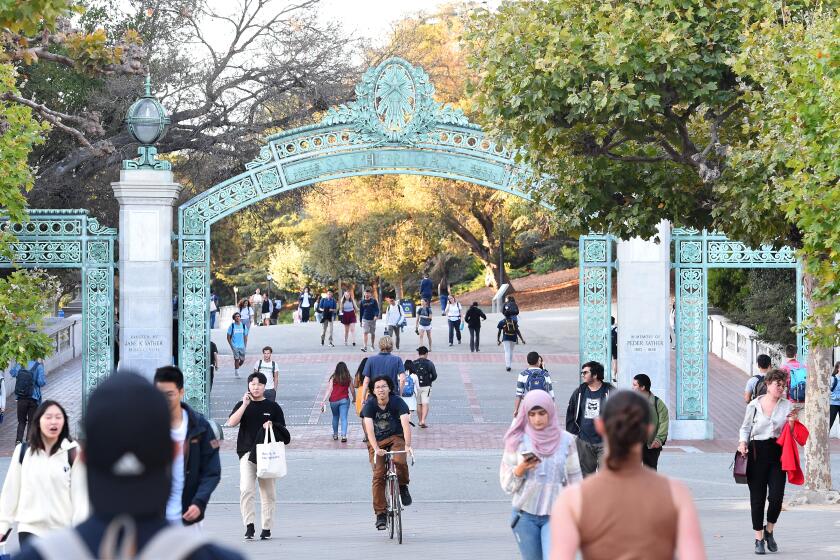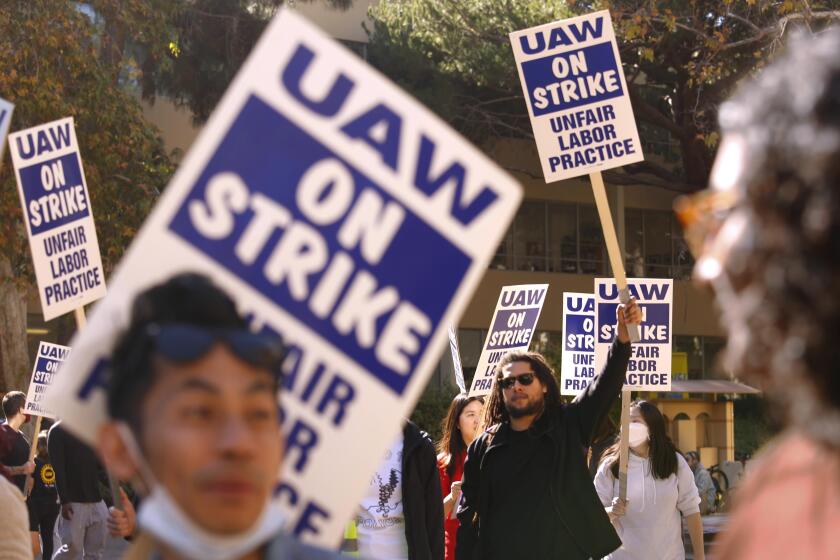UCLA, UC Irvine law schools join boycott of U.S. News & World Report rankings

- Share via
UCLA and UC Irvine Law Schools are joining the growing boycott of U.S. News & World Report‘s rankings, saying the methodology the publication uses penalizes institutions that encourage public law careers and seek to enroll students from diverse and marginalized communities.
The decisions amplify what is shaping into the biggest challenge yet to the college rankings industry, following similar decisions in the last week by other top law schools to shun the publication. At least half of U.S. News’ top 20 law schools have announced they will not participate in the rankings because of longstanding issues with the methodology. In addition to UCLA, they include Yale, Stanford, Harvard, Columbia, UC Berkeley, Georgetown, Michigan, Duke and Northwestern.
USC Law, which is currently No. 20 in the U.S. News rankings, has not joined the boycott or provided any statement about it. Among California law schools, Stanford is ranked No. 2, UC Berkeley No. 9 and UCLA No. 15.
“The rankings disincentivize schools from supporting public service careers for their graduates, building a diverse student population, and awarding need-based financial aid,” UCLA Law School interim Dean Russell Korobkin said in a message Tuesday to the law school community. “UCLA Law does all of these things, but honoring our core values comes at a cost in rankings points.”
UC Irvine Law School, which opened in 2009 and is ranked No. 37, announced its withdrawal from the rankings on Wednesday.
“In all that we do, we emphasize public service, social justice, and global engagement, and we recruit students who share our vision,” Dean Austen L. Parrish said in a message. “Our students want to do more than just learn the law; they want to lead and to make an impact in their communities. Our vision... is defined by advancing the upward mobility of first-generation students and those underrepresented in the legal profession, while being innovative in how we approach our research and scholarship, our teaching, and our community engagement.
“Collectively we have determined that continuing to participate in the U.S. News rankings is not consistent with our founding ideals.”
U.S. News officials have said their organization would continue to rank the nearly 200 or so fully accredited law schools, regardless of whether the institutions agree to submit their data. Much of the information used for the rankings is publicly available.
“The U.S. News Best Law Schools rankings are for students seeking the best decision for their law education. We will continue to fulfill our journalistic mission of ensuring that students can rely on the best and most accurate information in making that decision,” Eric Gertler, executive chairman and chief executive of U.S. News, said in a statement. “As part of our mission, we must continue to ensure that law schools are held accountable for the education they will provide to these students and that mission does not change with these recent announcements.”
UC Berkeley and Stanford join a growing boycott among top law schools of U.S. News & World Report’s closely followed rankings of higher education institutions.
Parrish said that response, which he said did not substantively address the issues raised by myriad law schools, also caused concern and contributed to UCI’s decision to join the boycott.
Korobkin, of UCLA Law, took issue with several aspects of U.S. News’ review method. He said the rankings rely on unadjusted undergraduate grade point averages to measure the quality of students, penalizing those who take classes that tend to award lower grades, such as math, technology, engineering and science. The law school dean said that discourages students from stretching themselves with more challenging classes and does not measure their academic ability or leadership potential. Other critics have said that the focus on GPA and test scores encourages law schools to award merit-based financial aid to draw top-scoring applicants rather than give need-based assistance, designed to offer greater access to low-income students.
Korobkin also criticized the use of subjective “reputation” ratings of law school faculty and programs provided by a small number of lawyers, judges and professors. He said such evaluators “cannot hope to have detailed knowledge of the nearly 200 schools they are asked to evaluate, rather than using more quantifiable measures.”
Like UC Berkeley and other institutions, UCLA Law is also dismayed that the rankings discourage students from entering public law.
UC Berkeley, for instance, provides students a fellowship for a year after graduation to work in a public interest organization. Students receive a salary comparable to an entry-level position in public service or public interest and a stipend during study for the bar exams. Nine of 10 students who receive a fellowship remain in public service law, according to UC Berkeley Law Dean Erwin Chemerinsky.
But U.S. News does not count these fellowship students as fully employed, creating a “perverse incentive for schools to eliminate these positions, despite their success and despite the training they provide for future public service attorneys,” Chemerinsky said last week in announcing the school would join the boycott.
In addition, Korobkin said that U.S. News rewards schools for spending more on their students. But that disadvantages public law schools, he said, which tend to spend less and charge less than private schools.
To make matters worse, Chemerinsky said, a law school’s per-student spending is adjusted according to a surrounding area’s cost of living. This means high-cost regions, such as the San Francisco Bay Area, are penalized despite the lack of evidence that such metrics are related to academic quality. UC Berkeley’s statistical analysis showed that the cost-of-living adjustments alone lowered Berkeley’s U.S. News ranking of No. 9. It contributed to elevating Yale in New Haven, Conn., to No. 1, over No. 2 Stanford, in Palo Alto.
The union said the two sides remained far apart on compensation, a major sticking point, as the work stoppage by 48,000 academic workers went into Day 4.
Some other top law schools that have not joined the boycott said they are evaluating the issue, but have echoed the criticism.
In a statement last week, the University of Pennsylvania law school applauded its peer institutions “for their leadership in raising key questions.”
“Among the problems with the current system, the U.S. News algorithm severely undercounts money spent on financial aid for students, while fully rewarding schools for every dollar spent on faculty and administrator salaries and other operating expenses,” the law school said. “The rankings do not provide a holistic view of how legal education is meeting the needs of today’s society.”
In an interview, Korobkin said the time taken to discuss the issue with faculty and alumni did not focus on whether the ranking methodology was flawed — there was “no question” that it is, he said. Rather, the school debated whether taking a position would make a difference, since 80% of the information used by U.S. News is publicly available.
In the end, he said, the law school believed it should take a public stand.
“It is important for us to use this moment to reinforce our values and do what we can to encourage positive change by withholding our cooperation,” he said. “We are eager to work with U.S. News, or with any other organization that wishes to rank law schools, to help determine a methodology that can provide useful comparative information for potential students without creating harmful incentives for schools that fail to encourage the improvement of legal education.”
More to Read
Sign up for Essential California
The most important California stories and recommendations in your inbox every morning.
You may occasionally receive promotional content from the Los Angeles Times.
















